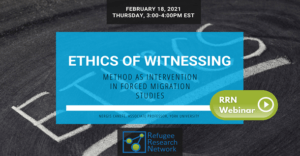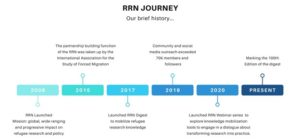The RRN Research Digest provides a synopsis of recent research on refugee and forced migration issues from entities associated with the RRN and others.
You can download the digest in PDF format here: RRN Research Digest No. 101
This webinar will focus on capitalizing the scholar’s responsibility as a witness, maximizing its potential and benefits for institutional and social change, and tracing and teaching an ethics of witnessing in its most adequate and resonant forms. Overall, if we are to defend a theory of ethics that is focused on the scholar’s role in enhancing human dignity and rights against all odds, we must start with providing a road map for our students. The webinar will provide select case studies and examples of engaged research in dealing with humanitarian crises, rights abuses and in general situations of gross human vulnerabilities as they pertain to the specific context of forced migration. It will also showcase some of the publicly accessible methods and models of knowledge mobilization and sharing.
Guest speaker: Professor Nergis Canefe (PhD & SJD) is a Turkish-Canadian scholar of public international law, comparative politics, forced migration studies and critical human rights.
Recent Publications and New Research
Foroutan, Y. (2020). Ethnic or Religious Identities?: Multicultural Analysis in Australia from Socio-Demographic Perspective, Journal of Ethnic and Cultural Studies, 7 (1): 1-19. Focusing on the data of ethnic and religious identities in a multiethnic and multicultural context, this paper provides research-based evidence to explain whether and how significantly such data could be reliable from a social and demographic perspective. The explanation is based on population census that also provides unique nation-wide data sources on ‘religious affiliation’. The field of this study is the multiethnic and multicultural context of Australia that holds a large variety of ethnic, religious and cultural groups from throughout the world. According to the findings, this paper argues that if ethnic migrants belonging to the same category of religious affiliation are considered a single group without taking their ethnic origins into account, this will lead to insufficient, incomplete, and misleading knowledge. Read more.
Beyond 2020: Renewing Canada’s Commitment to immigration, Metropolis eBooks – Volumes 1 & 2. Selected presentations from the 22nd Metropolis Canada Conference. The articles in Volume I deal with the nuts and bolts of integration and settlement questions, drawing on the insights of research and practice in the field from several forward-looking studies and pilot projects. Volume II looks at the role of media and digital technologies and takes a broader national and international policy perspective. Download Volume 1 and Volume 2.
Garcia, S., & Barclay, K. (2020). Adapting Research Methodologies in The Covid-19 Pandemic, Resources for researchers 2nd edition, Nippon Foundation Ocean Nexus Center. This document is the second edition of a compilation of resources addressed to junior researchers whose social research projects have been affected by the COVID-19 pandemic. It includes insights from academics and junior researchers on the opportunities and challenges involved in conducting social research in the context of COVID-19. The document has three parts. The first section offers an overview of qualitative, semi-qualitative and quantitative methodologies and methods that may provide feasible research design and data collection alternatives. The second part contains insights from researchers gathered through interviews with PhD candidates, researchers, and supervisors; finally, it lists a selection of online discussions and resources on how this adaptation is taking or may be taking place in the near future. Access here.
Averhed, Y. (2020). The breathing space or impact of temporary protection on integration from the perspective of refugees. School of Advanced Study, University of London. In July 2016, the Swedish government adopted temporary legislative changes to the asylum regulation in force, significantly limiting the possibility of being granted a permanent residence permit. The government presented the temporary law as an incentive for the immigrants to focus on employment, leading to permanent residence. This study exploits the impact of temporary protection on labour market integration and social inclusion from the perspective of refugees and subsidiary protection holders. Applying the ground research methods, the data was collected via focus group and in-depth face-to-face interviews with both temporary and permanent protection holders. The main conclusion is that temporary residence hinders the labour market integration of refugees and subsidiary protection holders, potentially leading to higher levels of social exclusion. Read here.
BRMC Research Digest – Winter 2021: Newcomers’ perceptions and experiences of their reception, Avenues of reflection on the Photovoice method, Building Migrant Resilience in Cities (BMRC), January 11, 2021. For a research project aiming to explore newcomers’ perceptions and experiences of their reception in two Montreal districts, the research team used the Photovoice method. The questions guiding this research were: What spaces are perceived as welcoming or less welcoming by newcomers? According to immigrants, what characterizes a welcoming district? This document proposes avenues of reflection on the advantages and challenges of this method in the search for answers to these questions. Read here.
Reports, policy briefs and Blogposts
From Displacement to Development: How Colombia Can Transform Venezuelan Displacement into Shared Growth, By Martha Guerrero Ble, Izza Leghtas, Daphne Panayotatos, & Jimmy Graham, Refugees International and Center for Global Development, October 28, 2020. This case study is part of the “Let Them Work” initiative, a three-year program of work led by the Center for Global Development (CGD) and Refugees International and funded by the IKEA Foundation and the Western Union Foundation. The initiative aims to expand labor market access for refugees and forced migrants, by identifying their barriers to economic inclusion and providing recommendations to host governments, donors, and the private sector to overcome them. The primary focus is on refugees and forced migrants in Colombia, Peru, Kenya, and Ethiopia, with other work taking place at the global level. Read here.
At the Starting Gate: The Incoming Biden Administration’s Immigration Plans, by Doris Meissner & Michelle Mittelstadt, Migration Policy Institute, November 9, 2020. This policy brief outlines some of the incoming administration’s top immigration priorities and examines challenges and opportunities ahead. Drawing on existing and forthcoming policy ideas from MPI’s Rethinking U.S. Immigration Policy initiative, the brief sketches several proposals that could begin to shape a U.S. immigration system that advances the national interest going forward. View or download full report here.
Starting Early to Address Migration-Related Trauma by Caitlin Katsiaficas, Refugee REACH Initiative at the Harvard Graduate School of Education, January 14, 2021. There is a growing understanding among researchers and practitioners of the effects of trauma on young children. However, there is a critical gap in attention to and services for young refugees and immigrant children. This blog highlights the importance of taking a whole-family approach to trauma and ramping up services for immigrant parents and their children through early childhood services and cross-sectoral collaboration, citing examples in the United States and Canada. Read here.
The pandemic is no excuse to shut the door on refugee resettlement, by Evan Jones & Nadjeeba Wazefadost, The New humanitarian, January 25, 2021. Many refugees have lost access to their livelihoods and have been pushed to the brink of destitution. Some have even been forced to return to the country they fled through deportation, or due to a lack of options in their host country. By and large, resettlement and other migration pathways have become increasingly limited during the pandemic. The authors explain why countries should be expanding, not reducing, refugee numbers in 2021. Read here.
Digital and social media
Temporary by Kaldor Centre. This project is a rich storytelling hub revealing the experiences of refugees in Australia who are under temporary protection. It explores – in long-form stories, podcasts, art and photography – the lives of people who came to Australia seeking refuge, and the laws that entangle them in an endless uncertainty. Their journeys come to life in powerful stories, vividly illustrated by refugee artists and photographers. Their voices rise from an eight-episode podcast series, co-produced with UNSW Centre for Ideas and Guardian Australia, with a soundtrack created by an award-winning composer currently seeking asylum. Start with the full stories, or with the podcasts.



